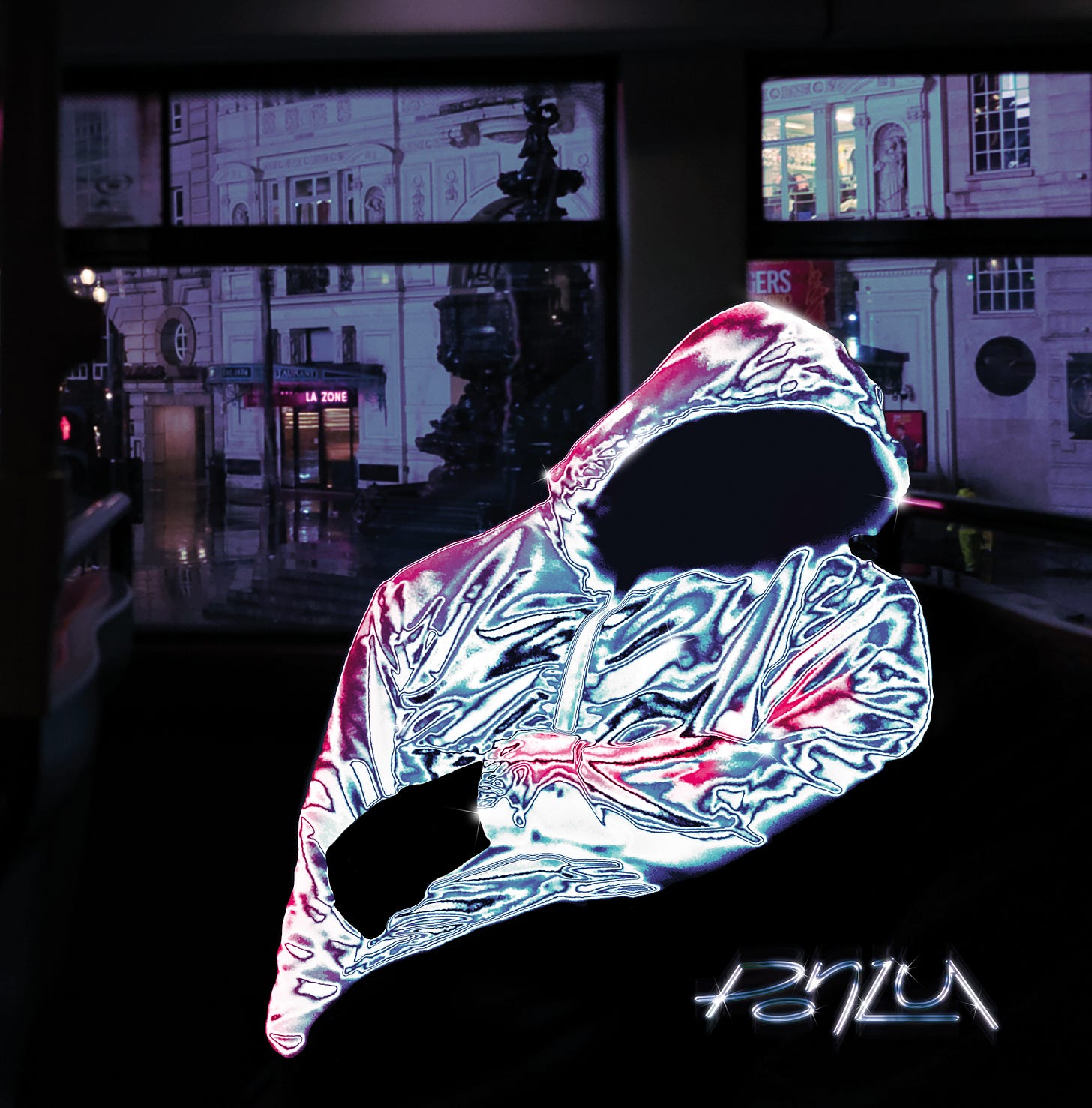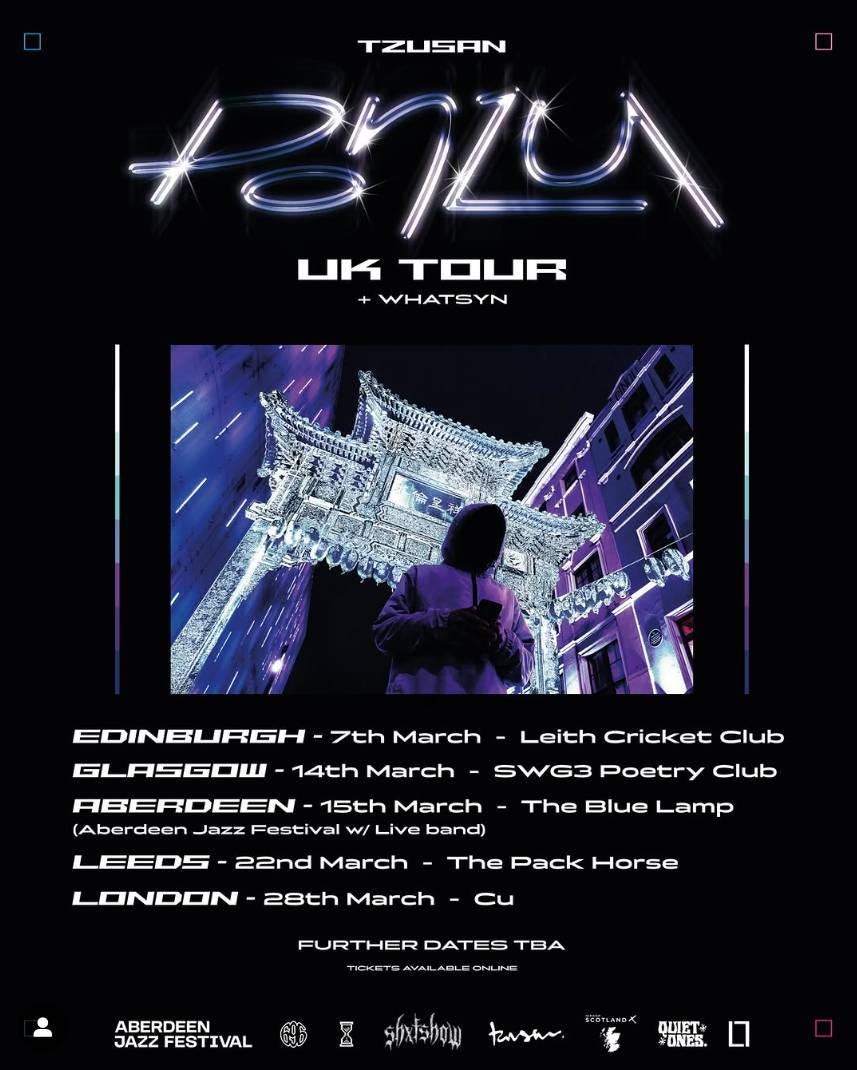I speak to rapper and producer Tzusan about his new album Ponzu, which explores a hauntological soundscape inspired by 80s cyberpunk fiction, digital dancehall rhythms and critical theory.
Tzusan is a hip-hop artist originally from Edinburgh, now living in Brighton. He has worked with world-renowned hip-hop crews such as High Focus, and was one of the original members of Scotland’s critically acclaimed Skoop collective.
Discussing Ponzu, we unpack some of the album’s key influences and its genesis, travelling from the wacky counter-cultural concepts of Philip K. Dick to the spectral sounds of Burial.
Recommendations from Tzusan
Escapism can be dangerous. What do you do when every week catapults you further into a glossy dystopian sci-fi unfolding in faster-than-real time? Sometimes it’s a pleasure to explore the rabbit holes of your imagination and sometimes life drags you into one, kicking and screaming…
Slowly the album had built up around a grain of sand like scum accumulating in an oyster to form a pearl. Layers of Mark Fisher, 4am speed-garage, and late-night Tonkotsu pressed up against long car journeys and rowdy Grime sets …
Lofi crackle crushed under the combined weight of the distraction economy and digital hyper-realism. Dragonflies in my algorithm. Panic attacks at the afters. White deer on the tracks between Croydon and Gatwick…
This text opens the press release for Ponzu, and it nicely sets the scene for my conversation with Tzusan. As he alludes towards the end of the episode, this is a man with a keen feel for vibes, atmosphere and imagery, and he may well turn those skills towards other art forms in the (no doubt dystopian) near future.
We started by talking about his roots in hip-hop and his early days as a producer. We mention Darren McGarvey aka Loki, whose recent album Not Funded By Creative Scotland was the focus of Episode 31 of Strange Exiles. He’s another example of a Scottish rapper whose work outwith the rap scene has brought him success and acclaim — we discuss a few more later on.
Tzusan mentions some of his early contemporaries, including Konchis, now known as Wav Machine, who gave him his first copy of Fruity Loops. He also mentions rapper Silvertongue, an Edinburgh stalwart from the 2010s, and the early ‘aqua crunk’ style of bass music from Glasgow label LuckyMe.
One of the biggest influences on Ponzu was Japanese City Pop. Here’s an article with a basic introduction to the genre, a look at some of the key artists, and Cat Zhang with a longform piece on the genre for Pitchfork back in 2021.
Tzusan briefly mentions cross-modal perception, a group of disorders (or perhaps better, mutations) that includes synaesthesia. We discuss William Gibson and Philip K. Dick, and briefly touch on the desire for the classic ‘Star Trek future’ of post-scarcity, perhaps best expressed by Aaron Bastani as Fully Automated Luxury Communism.
We also briefly talk about Ivor Cutler, the beloved poet and surrealist, who Tzusan rapped about back in 2021. As he mentions, Cutler is a great example of a peculiarly British vein of surrealism and comedy that also manifests in The Mighty Boosh.
We go on to discuss Jean Baudrillard and hyperreality. Here’s an explainer on this and other concepts from Baudrillard, courtesy of YouTuber Andrew Reszytnik. Ponzu is a record that swims in the deep waters of hyperreality, simulacra, and the spectral nature of identity, media and entertainment — anyone who’s explored the mirror worlds of Baudrillard’s theories will definitely get a kick out of its themes and aesthetics.
We discuss a few more of Tzusan’s past collaborators and contemporaries, first and foremost Shogun, who UK readers may recall either from his viral freestyle Vulcan, or from his appearance on an early series of the BBC’s show The Rap Game. I first met Shogun, before he made Vulcan, at a BBC Radio 1Xtra event for emerging spoken word performers. It was clear even then that he was one of the most devastatingly talented rappers Scotland had ever, or would ever produce.
You should check out Shogun’s 2018 debut DieSho, and his two albums with Tzusan — 2023’s Lead Wetsuit Schematics, and 2024’s Doctor Dunbar’s Travelling Taxidermy Service. Both are incredible showcases of his skills. His hard-edged, darkly comic bars pair well with Tzusan’s psychedelic imagery and drug-soaked storytelling. See the anthemic Ziggurat, below, for a showcase of their considerable talents.
Another early Tzusan collaborator is CRPNTR aka Owen Sutcliffe, who recently made the jump from hip-hop and spoken word to theatre with his critically acclaimed show Òran at the 2024 Edinburgh Fringe. I mention Solareye, hip-hop academic and frontman of Stanley Odd, as another rapper who made the jump from hip-hop to theatre with A Giant on the Bridge. I also idly wondered what it would be like to watch a Penpushers opera. A boy can dream.
We briefly talked about a few other folks from the world of hip-hop we admire at the moment — Tzusan recommends The Holocaust aka Warcloud as a pioneer of sheer lyrical dexterity; I plumped for Yeat, who flips mumble rap on its head to deliver something simple, but very clever.
We dipped briefly into this Edward Snowden piece on conspiracy theories for The Guardian in 2021, before a deep dive into some of the influences and collaborators on Ponzu. This included Shetlandic pop siren philomenah, who Tzusan credits for introducing him to hauntology and Mark Fisher. For philomenah, hauntology and hyperpop are on opposite ends of an aesthetic spectrum — Tzusan set out to close the gap on Ponzu, taking in influences from artists like Sega Bodega, Palmistry and SOPHIE.
I went on to recommend some of the core ‘hauntological’ artists of the past decade, including Belbury Poly and Pye Corner Audio, both of whom were affiliated with the label Ghost Box. We go on to talk about digital reggae, in particular the Jahtari label, and the origin story of Under Mi Sleng Teng, told here by Reggae Roast. I’ll finish this episode’s show notes with Tzusan’s full Brian Eno quotation:
Whatever you now find weird, ugly, uncomfortable and nasty about a new medium will surely become its signature. CD distortion, the jitteriness of digital video, the crap sound of 8-bit - all of these will be cherished and emulated as soon as they can be avoided.
It’s the sound of failure: so much modern art is the sound of things going out of control, of a medium pushing to its limits and breaking apart. The distorted guitar sound is the sound of something too loud for the medium supposed to carry it.
The blues singer with the cracked voice is the sound of an emotional cry too powerful for the throat that releases it. The excitement of grainy film, of bleached-out black and white, is the excitement of witnessing events too momentous for the medium assigned to record them.
Tzusan is on tour in the UK throughout March. If you get a chance to catch him, don’t sleep! He’s a phenomenal live performer, and there are some amazing guests lined up for each stage of the tour.
Have a listen to Ponzu below and support independent music!
Next up…
I hope you enjoyed our first video episode! Please let me know in the comments if you dig this format, and I’ll make more in the coming months. The technology and production values will improve as we go.
I’ll be back later this month with another episode, this one firmly back in the realms of politics and ideology…. more on that soon.
In other news, Revol Press is now on Substack! I’m co-editing the Revol newsletter with Mike, and we’ll be publishing new episodes of Theorize And Be Damned there for subscribers before they drop on YouTube. Expect exclusive essays, debates, opportunities for writers and much more. Head over there now and subscribe, and check out the latest episode, featuring a conversation about Trump, resistance to fascism, and art as activism with Terry Tapp, and Locust Review editor Adam Turl.
Until next time… take care of each other.
-Bram, Glasgow, February 2025
Support my work:
Explore my writing: linktr.ee/bramegieben
Read my book: linktr.ee/thedarkesttimeline
Follow @strangeexiles for updates on Instagram and Twitter

















Share this post